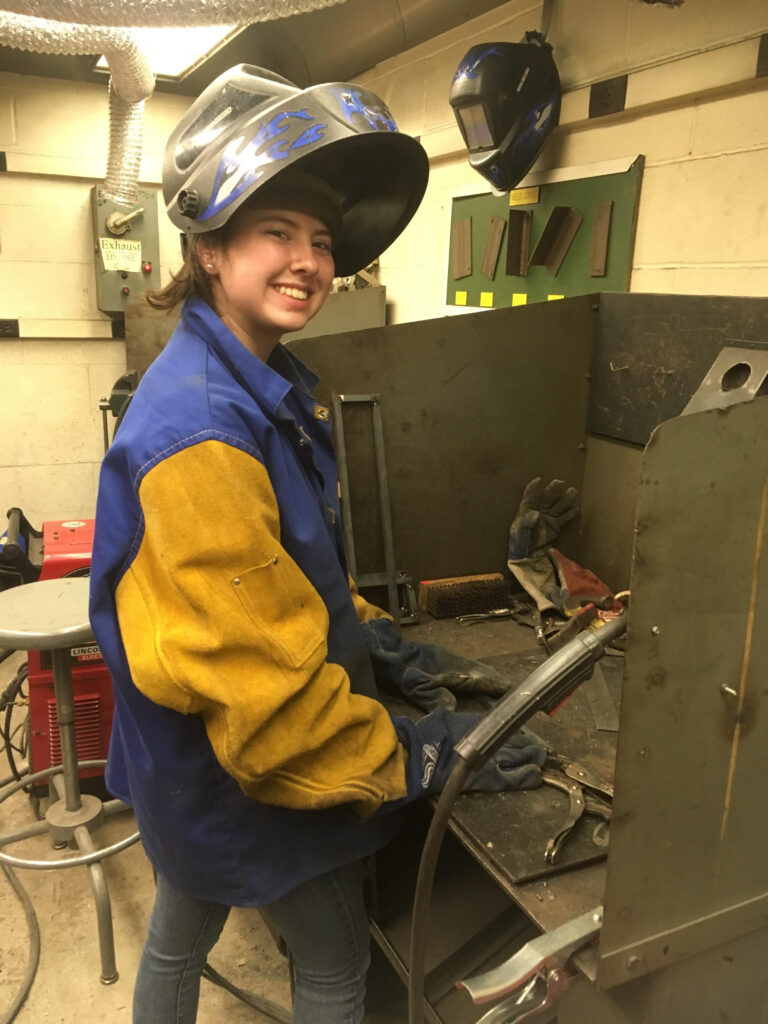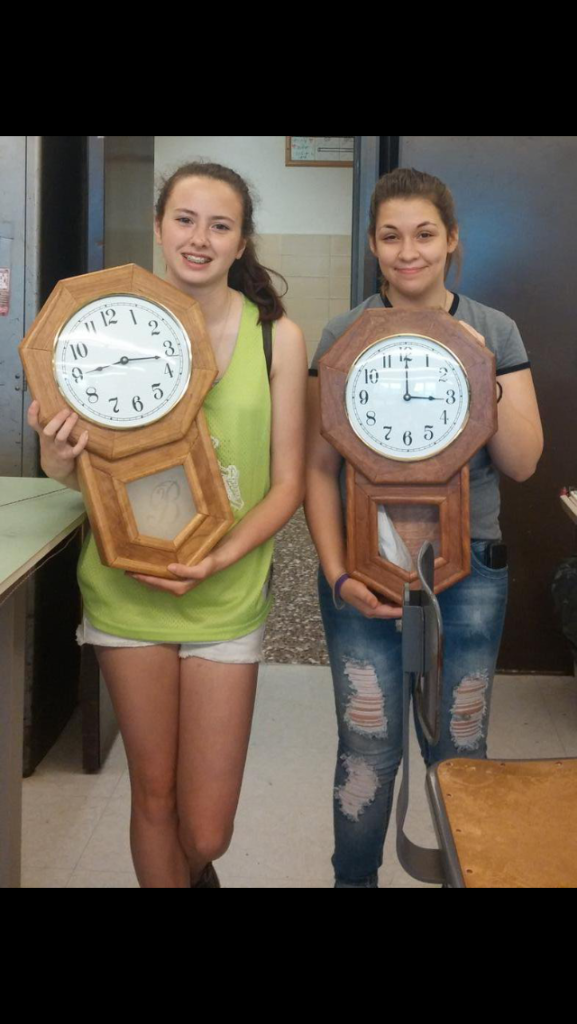As I got ready for freshman year, I looked at my first-semester schedule and the classes I was taking. All the standard courses, naturally, as well as my elective, Designs I got ready for freshman year, I looked at my first-semester schedule and the classes I was taking. All the standard courses, naturally, as well as my elective, Design and Drawing for Production (DDP). My technology teacher had encouraged me to take the course after seeing my work in eighth grade, and I, not someone to back down from a challenge, signed myself up right away. Once September rolled around, I found myself stumbling through the hallways until I finally made it to E-wing. I looked for Mr. Blake in E16, which I soon found out was conveniently located in a tucked-away corner at the end of the hallway. I filed in with the rest of the students and found myself face-to-face with my new technology teacher.
Only, this wasn’t Mr. Blake. This was Ms. Blake.
I imagine my jaw dropped to the floor. I was astounded, faced with the most pleasant surprise of the week, the month, and the year. A female technology teacher? Oh yeah, I thought to myself as I walked around to find an open seat, this is gonna be a good class.
Soon, I found myself thrilled to rush out of fourth period (sorry, Honors Geometry) to head to DDP. Not only was the content new and exciting, but I found myself more motivated than ever by having a teacher that looked a little more like me than my past tech teachers had. Even though my class was mostly composed of white guys, I felt a little less alone having a female teacher in the room with me and the one other girl in my class.
I was completely oblivious to the fact that, even though this was so important to me, it seemed to have little effect on her male students, until one day during our daily “do-now” activity she asked us to write about what having a female tech teacher meant to us. While I picked up my pen and started frantically scribbling my radically feminist answer, some of the boys retaliated. I heard some comments along the lines of “what does it mean to me? It doesn’t mean anything,” or “why should it matter if men and women are the same?” And while a part of me was boiling over with anger, another part of me thought that maybe they were right. Maybe having a female teacher didn’t mean to them what it meant to me.
But it should matter, regardless of gender orientation. The fact of the matter is, there is so little representation in the engineering industry and we should amplify the diversity that we do have to invite more.
As I mapped this article out in my head, one thing was missing—perspective. I knew how it felt to be a student with a female technology teacher for the first time, but I didn’t know what it was like to be the teacher herself. So, in my quest for accurate and exciting coverage, I asked Ms. Blake to sit down with me and tell me about her first year of teaching, her experiences with the industry, and what impact she wants to have on IHS.
Zadie Wang: Who or what got you interested in your field?
Emily Blake: My love for technology and making things came from my grandpa. My grandpa would babysit me when my parents were at work, and I think he didn’t really know what to do with me, so we just made a bunch of projects. He was really into estate sales and garage sales and he would go and get these little kits where you glue the train and then you paint it and then it comes with the really cheap paint. We made birdhouses and toolboxes and little model trains and cars, and it was special to me because when the rest of my cousins were all born he said that he retired from babysitting. He really only wanted to babysit me. So I think that’s where I liked making things, and it continued on.
ZW: Were there any other women in your engineering classes and how did that affect you?
EB: I took tech in sixth, seventh, and eighth grade, that’s what it was in my school, and there were always girls in that class because everyone had to take it. And when I got to high school, because I liked tech so much I just signed up for all these tech classes without really even thinking that other girls wouldn’t be in my class. In my freshman year I started woodworking and that was really fun. I wasn’t very confident with woodworking and power tools and stuff like that. I think that showed, and my teacher was not super supportive—I think there was me and one other girl in the class—and my teacher was kind of just like, “oh, you don’t know what you’re doing,” when really it was just like, “I understood your directions, I’m just not confident and I’m unsure so I ask for clarity,” and he took it as me not knowing. That really just fueled the fire for me, and I actually ended up earning an excellence award in woodworking that year. He gave it to me anyway, even though I didn’t think he liked me!
ZW: Did you ever have a female teacher for engineering or was it always [male teachers]?
EB: So in seventh grade, I had a female technology teacher, and I was really excited about it. We didn’t really do any of what I would deem technology projects…we did science projects, almost? I remember we made an egg cast…and we did acrylic bending, which was cool. I liked that project a lot but [the class] was only for one quarter so I don’t think I got to really establish a connection with her. None in high school at all.
ZW: Tell me some ways that being a woman in engineering has affected your educational and employment opportunities.
EB: When I was picking my classes in high school I feel like I got put in a lot of the classes that I wanted, and I don’t know if that was like a push for more girls to sign up for tech or anything like that. But I do remember I took a class with my teacher Mr. Kennedy, who retired when I graduated…he used to sign me up for all these scholarships without telling me, and then like I would just win, usually a free application to a college.
I was dead-set on being an engineer from the age of twelve, and I remember [Mr. Kennedy] telling me my junior year, or maybe my sophomore year, to become a tech teacher, and I was so offended because I thought, “oh he doesn’t think I can make it as an engineer” but I think it’s because he really saw the potential because I was always helping everybody in my class. My senior year, when I had decided after working with children that I wanted to be a tech teacher, he was over the moon and set me where I needed to go.
In college, graduating in 2022, there were twenty-one of us that became tech teachers at the end of May and only four of us were women. Employment opportunity-wise, you can’t discriminate against anyone based on their sex but I do think it made me a more marketable candidate. It’s weird because, yeah, you don’t want to feel like the diversity hire but then when you’re in it it feels like people are discouraging you. There were definitely peers and teachers that were more discouraging of me, but then there was an entire group of people that were encouraging.
ZW: What do you love about being a woman in STEM?
EB: I love seeing my students who maybe [didn’t] traditionally [feel] like they belonged, whether that’s because of their gender, or their sexual orientation, or anything like that. I hope I’m welcoming to everybody—I was always uncomfortable in tech class growing up and I thought it was important to create an environment where everyone felt safe, so I love seeing those students who…didn’t think that they could succeed in tech, but then they succeed and it’s really rewarding. Representation, in my mind, is so important. You always look for somebody relatable in the room and so I think by having Mr. Atiba and maybe even me [as teachers], hopefully, it makes kids feel like, “maybe I can do that, maybe I do belong.”
ZW: Tell me about a time that you felt empowered in your field.
EB: I remember being in college when I was a freshman, and first semester you’re still meeting everybody. The tech department at Oswego was small enough that you kind of knew everybody. Out of around 260 students, there were only thirty women, which is wild to wrap my head around. I was kind of establishing myself, learning, doing a lot of work—I’ve always been pretty studious. I remember doing some project, I think it was in the second semester, and my teacher’s like, “pick a partner” and…a bunch of people tried to come up and be my partner because they were like, “ask Emily, she knows, she’s the smartest one in the class.” That made me feel good because in high school, I used to get [comments] like, “oh, did you think this was an art class?” I actually had a peer in my class ask if I was only in a class because my boyfriend at the time happened to also be in the engineering class. And I don’t think they realize how hurtful that is, but it’s not very acceptable.
ZW: What do you want your students, regardless of gender orientation, to learn from you?
EB: I want them to be able to feel empowered to learn that if they don’t necessarily feel comfortable in a space, they should still want to try to be there and try their best. And I kind of also would like someday, hopefully, the perception of a tech teacher melts away. On the first day of school, I think everyone’s SchoolTool has just “Blake” on there and half of my students came in expecting a Mr. Blake. Which is fine, that’s how they grew up, whatever, but like I think it’d be cool to watch that melt away.
People always say, “that’s so cool that you’re a female tech teacher,” and then they’re like “oh, I hope that’s not offensive,” and I’m like, “no, I think it’s really cool too! I think it’s awesome.” Technology’s a great place to practice and learn and grow and try, try, try again.
ZW: Is there anything you want younger girls out there, either in your class or anybody who’s reading this, to know about being in the field?
EB: If they doubt you, just show ‘em up! There’s a world of people that are looking at [you] as their role model. And there might not be enough role models that look like you yet, but there will be. Be the role model you wish you had or hope to see.



